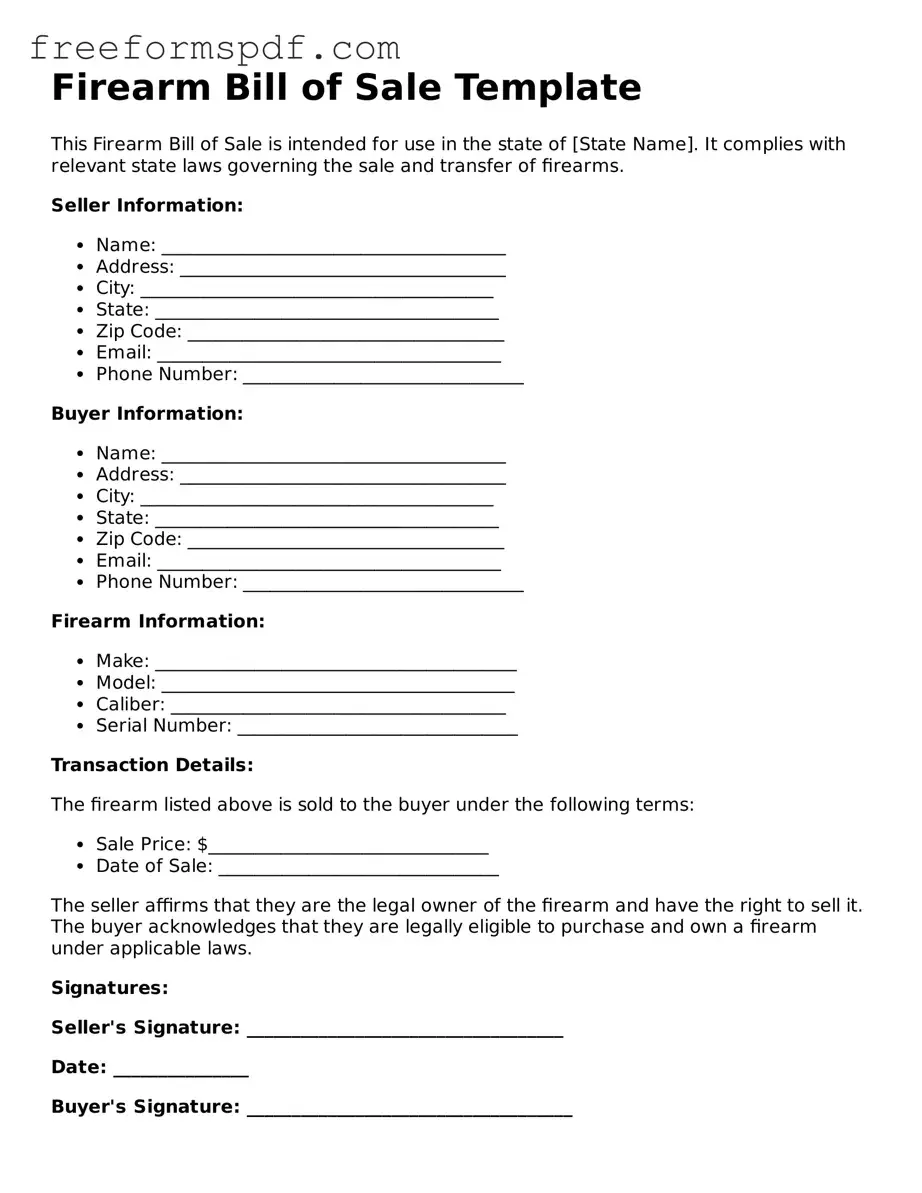Firearm Bill of Sale Document
Firearm Bill of Sale - Customized for Each State
Common mistakes
-
Incomplete Information: One common mistake is failing to provide all required details. This includes the names, addresses, and signatures of both the buyer and seller. Omitting any information can lead to complications in the transaction.
-
Incorrect Firearm Details: Buyers and sellers often neglect to accurately describe the firearm. Essential details such as the make, model, caliber, and serial number must be precisely recorded. Errors in this section can create legal issues down the line.
-
Not Following State Laws: Each state has specific regulations regarding firearm sales. Failing to adhere to these laws can result in penalties. It is crucial to understand the local requirements before completing the form.
-
Missing Signatures: Both parties must sign the form for it to be valid. A frequent oversight is neglecting to obtain the necessary signatures. Without these, the document may not hold up in a legal context.
Learn More on This Form
-
What is a Firearm Bill of Sale?
A Firearm Bill of Sale is a legal document that records the sale of a firearm between a seller and a buyer. This document includes details about the firearm, such as its make, model, and serial number, as well as information about the parties involved in the transaction.
-
Why is a Firearm Bill of Sale important?
This document serves several purposes. It provides proof of ownership for the buyer and can protect both parties in case of disputes. Additionally, it may be required by law in some states to ensure that the sale is conducted legally.
-
What information is typically included in a Firearm Bill of Sale?
A typical Firearm Bill of Sale includes:
- The names and addresses of both the seller and the buyer
- A description of the firearm, including make, model, and serial number
- The date of the transaction
- The purchase price
- Signatures of both parties
-
Do I need to have the Firearm Bill of Sale notarized?
Notarization is not always required, but it can add an extra layer of authenticity to the document. Some states may have specific requirements regarding notarization, so it is advisable to check local laws.
-
Can I use a Firearm Bill of Sale for private sales?
Yes, a Firearm Bill of Sale is commonly used for private sales. It is important for private sellers and buyers to have this document to ensure that the transaction is properly recorded and legal.
-
What should I do if I lose my Firearm Bill of Sale?
If the Firearm Bill of Sale is lost, it is recommended to create a new document that includes all relevant details of the original transaction. Both parties should sign the new document to maintain a record of ownership.
Misconceptions
Understanding the Firearm Bill of Sale form is essential for both buyers and sellers. However, several misconceptions can lead to confusion. Here are six common misconceptions:
- 1. A Bill of Sale is a Legal Requirement in All States: This is not true. While some states require a Bill of Sale for firearm transactions, others do not. Always check your state laws to determine if it's necessary.
- 2. A Bill of Sale Transfers Ownership Automatically: A Bill of Sale serves as proof of the transaction but does not automatically transfer ownership. Legal ownership may still depend on state regulations.
- 3. The Bill of Sale Must Be Notarized: Not all states require notarization for a Bill of Sale. Some states accept a simple signed document, while others may have specific requirements.
- 4. You Cannot Sell a Firearm Without a Bill of Sale: While having a Bill of Sale is advisable for record-keeping, it is not always legally required. However, it is a good practice to document the sale.
- 5. A Bill of Sale Provides Legal Protection Against Liability: A Bill of Sale does not protect sellers from liability if the firearm is used in a crime after the sale. Legal protections vary by state and circumstances.
- 6. All Firearm Sales Require Background Checks: Not all sales require background checks. Private sales may not be subject to the same regulations as sales through licensed dealers, depending on state laws.
Being informed about these misconceptions can help ensure a smoother transaction process and compliance with applicable laws.
Other Types of Firearm Bill of Sale Forms:
Online Bill of Sale - Encourages responsible business practices in private sales.
Understanding the importance of a well-crafted Medical Power of Attorney form can significantly influence the decision-making process for your healthcare as it appoints a trusted individual to act on your behalf during critical times.
